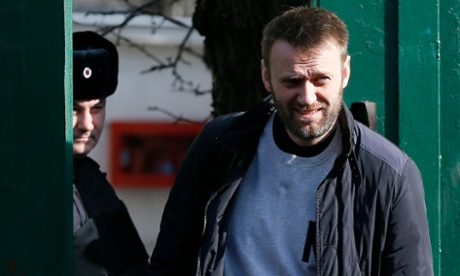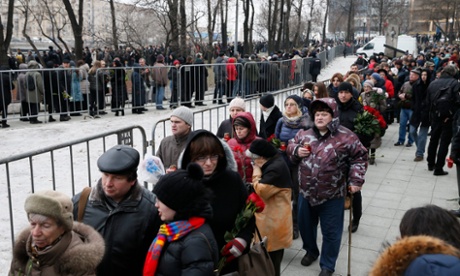Russia’s liberal opposition has been subjected to all kinds of pressure in the last few months, from leaked clandestine sex tapes to dubious court cases and physical violence. As parliamentary elections approach in September, the authorities appear to be throwing every dirty trick in the book at them. But the opposition is also engaged in a fight with enemies who are proving even more destructive than the Kremlin: each other.
Parliamentary elections on 18 September will set the tone for a presidential election in 2018, in which Vladimir Putin is expected to stand and win another six-year term in office. Currently, the Russian Duma is made up of just four parties: the pro-Kremlin behemoth United Russia, and three smaller parties known as the “systemic opposition”, which provide a semblance of competition but do not oppose the Kremlin on any substantive issues.
Lying outside the system are the other opposition parties, ranging in spectrum from liberals to nationalists. They are not given airtime on television and are often struck off the ballot in elections. With the political system carefully controlled and state television only ever covering the opposition in negative terms, there is little public support for rocking the boat. However, when the anti-corruption campaigner Alexei Navalny was allowed to stand for mayor of Moscow in 2013, he won 27% of the vote, showing there is appetite for new faces among a certain section of urban Russians.
Since then, the screws have tightened, and the Kremlin is determined not to allow any opposition parties to gain the 5% of the vote that would see them into the Duma and risk argument and controversy in the parliament. It would prefer the Duma to remain a rubber-stamp mechanism with almost no dissent. Authorities are also determined to avoid a repeat of the parliamentary elections in late 2011, when allegations of electoral fraud led to huge protests across Moscow.
“The Kremlin is taking a careful line: it has shown a small amount of tolerance but has also used violence and threats to warn people they really could lose their freedom if they protest too much,” said the political analyst Masha Lipman.
Navalny’s brother was jailed in a case that many saw as a way to get leverage over the opposition leader, and Boris Nemtsov, one of the better known and more charismatic of the opposition leaders, was gunned down outside the Kremlin last February.
As the parliamentary elections approach, the petty nastiness of the attacks on the liberal opposition has increased. State television aired a documentary smearing Mikhail Kasyanov, a former prime minister who is now one of the leaders of Parnas, Nemtsov’s former party. The programme showed footage of Kasyanov in a sexual encounter with an opposition activist, Natalia Pelevina, and the pair could be heard allegedly discussing other opposition leaders in a derogatory manner. It appears the audio and video recording devices were placed illicitly in the apartment, suggesting collusion between the television station and the security services.
In the wake of the film, many others in the opposition said it was untenable for Kasyanov to have the number one spot in the party list for the elections, while Kasyanov said to change the game at this stage would mean to bow to Kremlin pressure.
“There will be many more provocations. If you can’t put up with the authorities’ provocations and make concessions to them every time, it shows you are weak,” Kasyanov told the Guardian. He denounced criticism from other members of the opposition as “irresponsible statements by people who don’t understand anything”.
Ilya Yashin, another Parnas leader, fell out with Kasyanov over the incident, and also hinted that Pelevina could be an FSB plant. After much online rancour, Pelevina agreed she would not stand in the elections, but wrote on Facebook that Yashin was a “simple liar, petty and vengeful, and simply an indecent person”.
Following the scandal, a fragile opposition coalition of Parnas and Navalny’s Progress party collapsed in bad blood. Navalny is banned from running for office due to a conviction in a court case widely seen as politicised, and his party is not officially registered. Recently he called on the authorities to register his party and allow him to stand.
“Their strategy is to not let the really dangerous people take part, and then destroy the others using pressure and their own stupidity,” Navalny said. He insisted that Parnas would not pass the barrier required to enter parliament, whereas his own Progress party would have had a chance. Others are sceptical about this claim, but Navalny points out that he received more than a quarter of the votes in the Moscow mayoral elections with little publicity, showing that he can win support among urban elites.
“They expected I’d get 8% and disappear, but it turned out we were able to win votes. So after that, my legal conviction was activated and now I can’t take part in any elections, and I’m even officially banned from campaigning.”
In May, Navalny and supporters were physically attacked by a group of Cossacks during a visit to the southern Krasnodar region, while the police did nothing. A “documentary” on state-controlled television claimed Navalny was a British agent codenamed Agent Freedom, and had been tasked by MI6 with working to destroy Russia. The “secret MI6 documents” presented on the programme were written in semi-coherent English. Such programmes are augmented by Kremlin tales of western plots to destroy Russia, painting the opposition as pawns of Russia’s enemies.
Chechnya’s controversial leader, Ramzan Kadyrov, posted a photograph of Kasynanov on Instagram, with the politician’s head pictured in the sights of a sniper rifle. Kadyrov later claimed it was a joke, but given Nemtsov’s murder a year previously, nobody found it particularly amusing.
“We don’t know how ugly it will get and whether these people in the regions are acting on their own or acting on orders,” said Lipman. “But as the economic situation continues to be difficult we could see more and more violence.”
Kasyanov said he believed that even without access to television his party could win 20% in big cities, which would be enough to even out to 10% across the country and make it into the Duma, but most analysts say this scenario is unlikely: even if the opposition did get the votes, the “administrative resource” would be used to make sure they did not pass the barrier. With all these obstacles, the infighting among the opposition does nothing to help.
“We’re weak as it is, and to have these problems inside is pitiful and shameful,” said Pelevina. “It should be about survival for all of us. They killed Boris [Nemtsov]. They’re constantly jailing people. They’re doing things all the time. We should be working together and instead we’re doing the opposite.”











